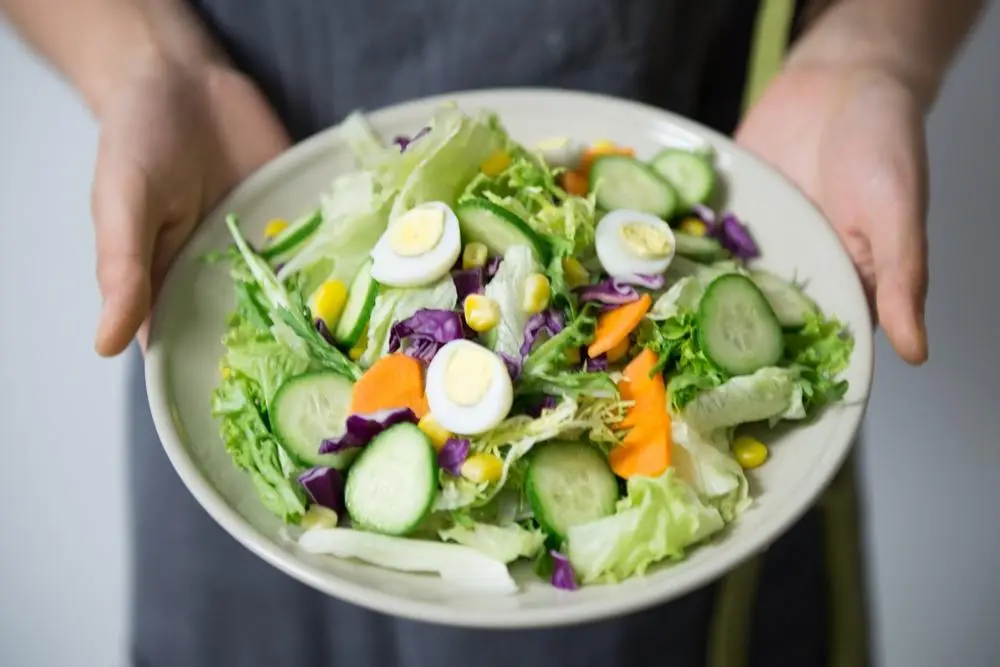For some people, it’s hard to adopt a totally different nutrition. They are so used to their current lifestyle that embracing a new one can be a daunting task. That’s why I crafted this useful article on how to go plant-based in 5 easy steps.
How to adopt a plant-based diet
As our society evolves, we are constantly facing the need to change our behaviors and habits to increase our health and quality of life. Food insecurity and over 40% of our population is suffering from chronic disease. One of the recent ideas put forward to improve our world and health is plant-based nutrition.
Here are 5 things that can help you go plant-based in 5 easy steps.
Eat more fruits and vegetables
Plant-based eating means that you have a large proportion of your meal that comes from plant-based food. That said, fruits and vegetables are often the number one thing that comes to mind when we think of plant-based nutrition.
Increase your fiber intake
Fiber is lacking in the nutrition of Americans. Fiber can be found in fruits, vegetables, whole grains, and legumes. Aim for food that is high in fiber such as black beans, bran cereals, or even broccoli.
Focus on plant-based protein
Try switching the protein type in your meals so that it comes from plants as opposed to animals. For example, make a salad with chickpeas instead of chicken or avocado instead of beef. Not only will this help you reduce your meat consumption, it will also help you not surpass the daily intake recommendation for protein since the average American eats twice the recommended daily intake.
Try new recipes
One of the most difficult parts about adapting to plant-based eating is to adopt new habits in the kitchen. It is strongly recommended to try new recipes as opposed to trying to adapt your old recipes to plant-based nutrition. For example, a plant-based Mac and Cheese does not have the same taste and texture as the real stuff.
Don’t be extreme
Plant-based eating can be for everyone, the main idea is not to diet or remove something from your nutrition but more about adding more vegetables, fruits, nuts, whole grains, and legumes. For those of you who love their steak or burgers once in a while, you don’t have to completely eliminate animal-based food. You can certainly reduce it by making more meals that are plant-based.
Take action
Now it’s time to put your learning into action. Slow and steady is a great approach to changing habits. This is not a diet but a way of living so have fun with it!
Myths about plant-based nutrition
There are some myths about plant-based nutrition. Some say that it is not a diet or doesn’t bring any value. But since we are hearing the word plant-based nutrition more and more in our society, it is pertinent to clear some point and get rid of the misinformation creeping up on social media and news.
Plant-based nutrition is in fact the original Paleo diet. We once believed that early humans consumed a large proportion of animal protein in their diet.
It is from that belief that, in the 2000s, the Paleo diet (mainly comprised of animal protein) became really popular in the world of nutrition and diet.
Although, we now know that the nutrition of bipedal primates and Homo sapiens was primarily composed of nuts, fruits, leaves, roots, seeds, and water. In that case, the original Paleo Diet was in reality plant-based eating.
In the world of nutrition, plant-based eating has a large portion of vegetables, fruits, herbs, nuts, and whole grains and also includes legumes or other plants.
Some are very strict (vegan diet), others are still adding animal products like dairy (vegetarian), and at the other end of the spectrum are those that still eat meat, poultry, and fish on an occasional basis. Plant-based eating can be for everyone, the main idea is to add more vegetables, fruits, nuts, whole grains, and legumes.
It was once believed that you needed to add animal protein to your meals to increase muscle mass. In fact, the strongest mammal is the gorilla (most are herbivores).
It has the ability to lift around 4409 lb. That is 10 times its body weight. If other mammals can live a healthy and strong life on plant-based nutrition, we probably can too.
Some studies and athletes have demonstrated that it is possible to increase muscles and be fit with plant-based nutrition. For example, one of the best runners of all time and American ultramarathoner, Scott Jurek is known to be a plant-based eater!
Ways to deal with situations
When you’re transitioning to a plant-based lifestyle, there are situations and doubts that might arise. So here are some of the most common and how to properly manage them.
What if I am invited to someone’s place for dinner?
Well, if you are a flexitarian, that shouldn’t be an issue since you have allowed some flexibility in your nutrition plan for situations like this. If you are a vegetarian or pescatarian, there is usually an option on the table, unless the person is making a meat lasagna, that would be difficult to opt-out.
In all cases, you might be able to prevent some uncomfortable situations and set yourself up for success by simply asking your host if you can bring a salad, and if that tactic doesn’t work, be honest. Compassion and honesty are the best policies!
That could also be an opportunity for you to share why you have chosen this goal. Caution, don’t be a preacher; no one likes to hear that what they are doing is wrong and what the other one is doing is better.
What if I am going out for a meal?
Be prepared! Always look at the restaurant menu before choosing where you will eat. While plant-based meal options are more prominent than ever, it isn’t always on the menu. If you forget to look at the menu in advance and end up in a place where you have no options, choose a garden salad or ask for a menu item without the meat.
What if I eat meat by mistake?
As a plant-based eater, it might happen that you realize there is chicken in your wrap or beef in your salad. No big deal, you’ve eaten meat before. On the other hand, if you are going for the vegan option, you will need to do some research on what ingredients are vegan.
Condiments like mayonnaise, Worcestershire, or horseradish sauce may contain animal products. Make sure that you are well informed on products that are vegan-friendly.
Are potato chips plant-based?
Yes, potato chips are technically a plant-based food but beware of junk food! It’s a highly processed food that often contains a large amount of sodium.
If you stick to the recommendations of the daily intake of 2300 mg of sodium and 50 mg of sugar, you will quickly realize that eating junk food is unsustainable since a bag of chips (party size) contains about 2550 mg of sodium and 15 g of sugar.
A 4 oz chocolate bar can contain 80 mg of sodium and 56 g of sugar. Add a can of regular soda (or pop) to the mix and you now have an additional 30 mg of sodium and 41 g of sugar.
What about milk?
Studies show that humans stop producing the enzyme that metabolizes the lactose in breast milk after an early age in life. That said, it is fair to say that we become lactose intolerant very early in our childhood. It is estimated that 75% of us are lactose intolerant.
Yet, many people in our nation continue to consume cow milk. Choosing a plant-based nutrition can be an opportunity for you to plant-based milk like almond milk, coconut milk, rice milk, etc. Many options are now available at most grocery stores.
What about fat?
Fat is a little bit harder to explain and a bit more complex to understand. As you’ve heard, there is good fat and bad fat. The number one rule with fat is to stay away from trans-fat, as soon as you see it on a label in the grocery store, put that item back on the shelf.
A general rule is that no more than 20–30% of calories should come from fat. The good news is that eating more vegetables and fruits can reduce the amount of fat intake.
What about physical fitness? And mental health?
As mentioned earlier, physical fitness plays an important part in health and weight loss. With plant-based nutrition, you will likely find yourself having more energy and will be motivated to be more active.
Don’t fall into the trap of committing to something you don’t enjoy. According to a study, 63% of gym members don’t use their membership.
Find something you enjoy doing and do more of it. Also, don’t stop yourself from being active because you don’t have a full hour a day to dedicate to it. A quick 20 minutes of high-intensity interval training (HIIT) is enough to make you sweat.
If you are already active, pay attention to changes in your body during the gym sessions, and after, you might want to increase your plant-based protein intake.
And mental health?
According to some research plant-based eaters showed fewer signs of depression and mental illness than omnivores. There is much more research to be done and certainly some aspects to consider (like sugar intake) but these researches are very promising. The best way to know is to try it and see how you feel.
Bottom line
Well, as said above, take it slowly. Going plant-based fast is not going to help you adopt this approach successfully. But you have to take action and start making changes in your eating habits.

David es escritor y profesor graduado. Escribe para diferentes sitios web. Con más de 7 años de experiencia en escritura y educación, David ha combinado su experiencia en la enseñanza con su pasión por el bienestar físico y mental. Investiga y escribe para brindarle información valiosa sobre pérdida de peso, nutrición, fitness, comunidad, sociedad y más.




